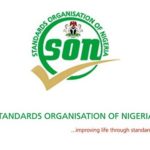Foremost maritime sector expert and Chairman, Ports Consultative Council (PCC), Otunba Kunle Folarin has stated that conflict in enabling laws, functions and ministerial supervision is a major reason why maritime agencies and interfacing agencies cannot always collaborate and corporate in the Nigerian maritime sector.
Fayose’s ex-appointees defect to APC
Speaking during a maritime training programme put together by the Nigerian Ports Authority (NPA) in collaboration with the Maritime Industry Advocacy Initiative (MIAI) in Lagos, the PCC Chairman listed different ministerial supervision as a major bottle neck against adequate collaboration among agencies of government located at the ports.
According to Otunba Kunle Folarin, “Looking at the scope of Nigeria’s maritime sector which comprises of 900 nautical miles of coastline, 12 nautical miles of territorial waters and 200 nautical miles of Exclusive Economic Zone with six littoral States on the Atlantic, it’s the biggest potential on the continent.
“Every day, $80bn Dollars is spent on importation into Nigeria, and more than $1.2 million enters Lagos alone on a daily basis from West and Central Africa. 60 percent of the economy of West and Central Africa is domiciled in Nigeria.
“The key question today is to address the issues facing maritime agencies in Nigeria. For the purpose of getting it in perspectives, I will mention a few of the affected agencies. We have the NPA, Nigerian Maritime Administration and Safety Agency (NIMASA), National Inland Waterways Authority (NIWA), Nigerian Shippers Council (NSC) in the maritime domain. We also have interfacing agencies like the Nigerian Railway Corporation (NRC), Nigerian Customs Service (NCS), Quarantine Services, Standard Organisation of Nigeria (SON), National Agency for Food and Drug Administration and Control (NAFDAC), Nigerian Immigration Service (NIS) and many more. We also have co-opted agencies in the maritime sector like the Nigerian Drug Law Enforcement Agency (NDLEA), Port Health, National Environmental Standard and Regulation Agency (NESRA). There are also intervening agencies like the Nigerian Police Force (NPF) and the Nigerian Navy.
“Many of these agencies have functions that cut across port administration, port management, port regulation, shippers protection and mediation, economic regulation, revenue collection, border enforcement, inland waterways management, immigration control, enforcement of food and drug regulation amongst others.
“In the critical area of Nigeria’s economy, these agencies have key roles to play. However, the issue of collaboration and synergy among these agencies has become questionable. This is so because there are conflicts of mission in the enabling laws of these maritime and interfacing agencies. There is also conflict of functions, conflict in ministerial supervision, amongst others.
“In a situation where the Nigerian Customs Service (NCS), an interfacing agency is under the Ministry of Finance, and is only answerable to the Ministry of Finance, while operating in the ports that is supervised by the ministry of Transportation through the Nigerian Ports Authority (NPA), then we are going to have issues.
“In a situation where the largest workforce in the ports, the Dock labour is under the Ministry of Labour while its members work in a Ministry of Transportation controlled ports, then we are going to have issues.
“The mission and vision of NAFDAC conflict with the mission and vision of the Standard Organisation of Nigeria (SON). That is why 40 containers of drugs were allowed to be shipped to Nigeria but were not allowed to be delivered in Nigeria.
“It is very difficult for these agencies to corporate because of different Ministerial control, different mandate, and conflicting enabling laws.






